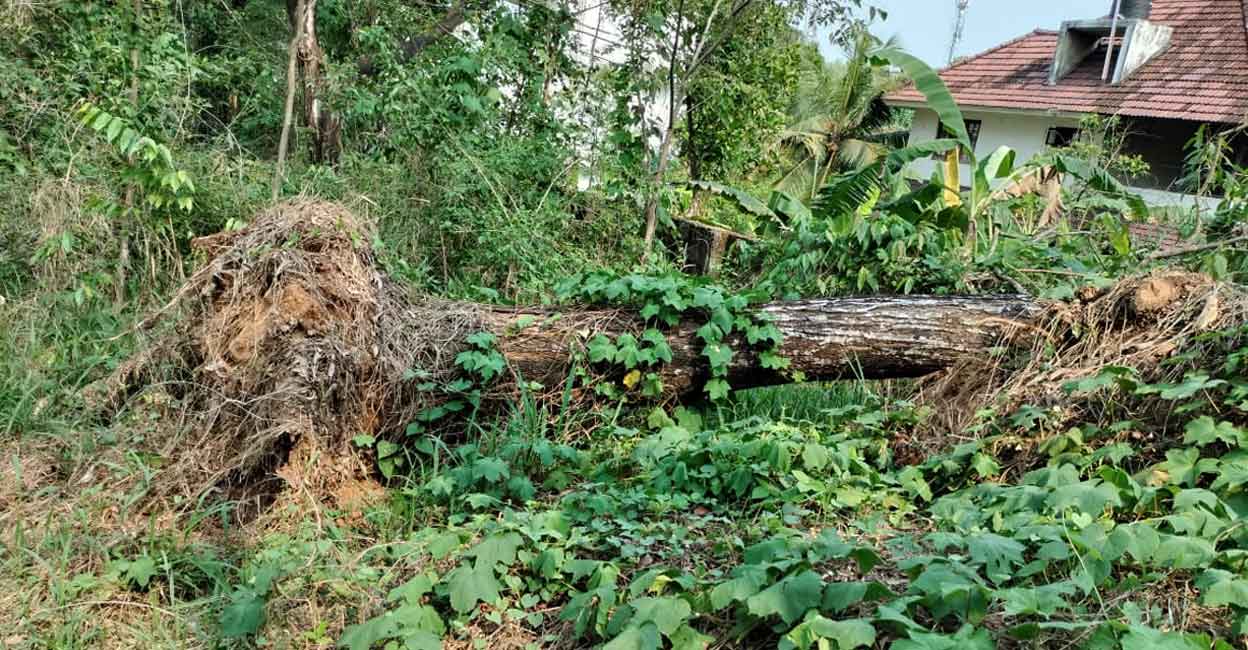Kerala professor's evergreen trouble: Forest dept's trees fall on his property, nobody dares remove them

Mail This Article
Kottayam: A government-sponsored greening effort has become a bureaucratic nightmare for a college professor in Kerala. Jacob Abraham, Professor of Electronics at Baselios Poulose II Catholicos College (BPC), Piravom, has been caught in a tangle after two massive acacia trees crashed onto his 10-cent plot on April 3.
The trees, each with a circumference of around 60 to 70 inches, were planted over a decade ago by the Forest Department as part of an afforestation drive on the Government Polytechnic College hostel premises at Nattakom. The approximately one-acre campus sits adjacent to MC Road and shares a boundary with multiple private properties.
“The Forest Department has washed its hands of the issue. They say the landowner is responsible for cutting and removing the trees. But the college authorities have told me they don’t have funds for it and that a decision can only be taken after a PTA executive meeting. I have no idea how long that will take,” said Abraham.
Removing the trees from the property would cost at least ₹25,000, he said. But the cost isn’t the only hurdle — the right to remove the trees rests with the authorities of the government-owned land.
Authorities at the Government Polytechnic College maintain that the delay is procedural. “I have met the owner. But we need a formal written complaint to begin the process. Then, a PTA meeting has to be convened to take a decision. There is a due process in government institutions,” said College Principal Prof. Sharmila. She noted that the college had recently spent ₹1 lakh to remove fallen trees from another nearby plot.
“This is not an isolated incident — one tree even fell on the asbestos roof of the same hostel building, which houses students from the Government College, Nattakom. That roof is still awaiting repairs,” Abraham said. Hostel authorities confirmed that the Public Works Department has estimated the damage and floated a tender.

The professor had flagged the risk eight years ago in a written complaint to the hostel authorities. BJP councillor Jaya C and another neighbouring plot owner, Cyril C, had also raised similar concerns two years ago.
“Last year, one of the trees fell onto the MC Road during the monsoon. The Fire and Rescue Department had to remove it. We had warned the authorities about the danger well before that incident. Though they promised action, nothing happened,” Jaya said.
R Keerthi, Conservator of Forests (Social Forestry), Northern Region, told Onmanorama that when a tree on government land falls, the head of the institution is responsible for ensuring its removal. "Once felled, the tree must be valued and auctioned—unless it's required for internal or welfare use," she said.
The trouble may not be over for Abraham yet — several more acacia trees stand dangerously tilted over his property. But action on those will also have to wait for the Tree Committee to convene. As per rules, any felling of trees on government premises due to safety concerns must follow an elaborate process. Approval must come from the Secretary of the local body or corporation, who acts as the convener of the Tree Committee. The Assistant Conservator of Forests must also sign off on the decision.
Before that, trees on land belonging to local self-government institutions must be inspected by the division’s Assistant Engineer under government supervision. In the case of other government departments, a competent senior official from the respective institution is tasked with carrying out the assessment.


